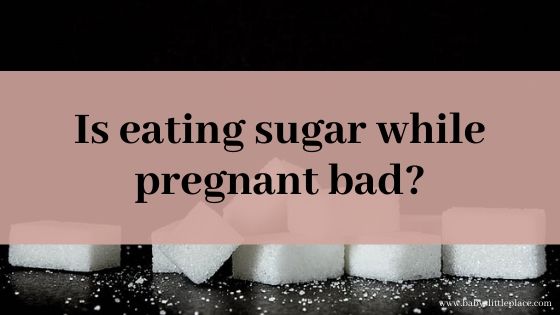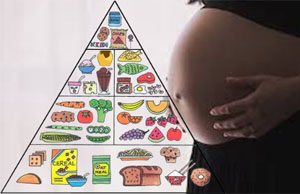
Should I avoid eating sugar in pregnancy?
Even a quick look at the food pyramid tells you that sugar is at its very top. That means it is among foods we should eat as little as possible. I won’t say eating sugar in pregnancy is bad for you, but you must consume it in moderation, like anyone else, pregnant or not. So yes, it is better to avoid too much sugar during pregnancy!

Why is better to avoid sugar during pregnancy?
A pregnant woman should eat healthy food, with lots of nutrients that are very beneficial for her and the baby. Sugar, however, unfortunately, does not belong to these foods. It is full of calories but doesn’t contain any nutrients. As such, sugar does not contribute anything nutritious to the pregnant woman, it is only to satisfy her desire for sweets.
Not just in pregnancy, eating excessive amounts of sugar is associated with obesity, cardiovascular disease. Sugar also reduces body immunity and causes tooth decay.
Replacing high sugar foods with foods that contain natural sugar is a good decision for everyone, not just for pregnant women! You can find natural sugar in fruits, vegetables, and whole grains.
The impact of eating sugar in pregnancy on your baby and you
Of course, I am talking about the excessive amount of sugar! Moderation is the key!
s, if everything is all right, you can eat sugar in pregnancy, as long as you don’t eat it too much! But, if you have gestational diabetes be extra careful about your sugar intake! In this case, consult with your health care provider about your further diet! Gestation diabetes is not something you should take for granted!
1. Sugar in pregnancy and cognitive development of your baby
According to a new Harvard study, eating excessive amounts of sugar in pregnancy can harm the cognitive development of your baby.
The cognitive abilities of the children who participated in the study were checked at three and seven years. They noticed there is a link between worse results and the fact that the mother was eating more sugar in pregnancy. The same applies to children who were eating too much sugar in their early childhood!
Children who were eating enough fruit during early childhood showed much better results! These three-year-old children also showed better motor skills and better verbal intelligence when they were seven.
2. Can I get gestational diabetes by eating too much sugar?
If you follow the healthy pregnancy diet, you’ve probably already noticed, it doesn’t contain a lot of refined sugar. Among refined sugars we eat every day, is white crystalline sugar, brown sugar, corn syrup, and fruit sugar.
After you consume sugar, your blood sugar rapidly increases, which causes high levels of insulin. That is a hormone that “removes” blood sugar from your blood. More sugar you eat, more insulin is in your blood. High insulin levels further lower your blood sugar below the standard level very quickly.
Because of that, the desire for sugar is present again. You are moving in the circle, where you have a constant craving for sugar.
As too much sugar increases glucose and insulin levels, some suggest that it can contribute to gestation diabetes. However, there is not enough evidence that eating sugar during pregnancy increases your risk of gestational diabetes.
3. Is eating sugar while pregnant associated with higher birth weight?
If you eat too much sugar, it can cross the placenta and increase the baby’s blood sugar levels. Because of that baby’s body produces more insulin, which can lead to higher birth weight. That can lead to complications during delivery or premature birth.
4. Other side effects of excessive sugar consumption during pregnancy
- The consequence of eating too much sugar in pregnancy is, of course, gaining too much weight.
- Sugar increases your energy level only for a short time. That is followed by a huge drop in blood sugar, which causes severe fatigue.
- Excessive sugar can worse everyday pregnancy symptoms, such as heartburn, mood swings, or vomiting.
- High sugar intake increases the risk of preeclampsia.
How much sugar is safe during pregnancy?
There are no standard recommendations for sugar intake during pregnancy, but it is good to eat less than 25 grams of sugar per day.
It is a fact that we have too much sugar in our daily diet. Most often, it appears as “hidden” sugar in biscuits, pastries, marmalade, various soft drinks, dairy products … Therefore, always read the label and make sure how high is the sugar content in your food or drink.
Besides “hidden” sugar, there is sugar you add to your food and drinks too.
For example, if you have two cups of coffee or tea with a teaspoon of sugar each day (a teaspoon of sugar = 5g), you will consume 10 grams of sugar just with that. Add all the hidden sugar, and you are quickly above 25 grams per day.
Soft drinks & sweets
Don’t forget about soft drinks and their sugar content!
Various soft drinks contain a lot of sugar, and many other potentially harmful substances, like additives. Usually, soft drinks contain two teaspoons (10 g) or even more sugar per 100g of drink. If you drink half a liter of drinks every day, you will get 1.5 kg of sugar per month or an annual 18 kg of sugar!
Avoid such drinks, especially during pregnancy! Water is the best choice. You can occasionally drink 100% fruit juice without added sugar as well.
Chocolate, biscuits, ice cream, fruit yogurts, cakes, … all contain a high amount of sugar. Not just sugar, but lots of fats too.
For example:
- 100 g of chocolate contains on average between 30 and 40 g of fat and between 35 and 45 g of sugar
- coconut biscuits contain about 35 g of fat and between 35 and 40 g of sugar/100g
- caramels contain about 10 g of fat and 50 g of sugar
- ice cream contains between 10 and 20 g of fat and 20 to 30 g of sugar per 100 g of the product
- pay attention to fruit yogurts and dairy drinks, because they usually contain 10g of sugar or more
Baby’s Little Place Tip: You can still eat sweet products, but follow the simple rule: moderation! Add less sugar when preparing desserts. And most importantly, eat only small quantities. Less is more!
Frequently asked questions about sugar in pregnancy
Should I eat brown or white sugar while pregnant?
Sugar is sugar. The difference in calorc value is minimal.
- refined, white sugar 387 kcal
- brown sugar 377 kcal
Also, there is no difference in the content of other substances. The difference is just culinary.
Can a healthy diet lower the blood sugar in pregnant women?
Yes, it can! Including healthy food in your diet, can significantly improve your overall health and decrease the blood sugar as well.
Probiotics:
Probiotics are healthy bacteria with a beneficial effect on your health. Probiotics not only takes care of the proper functioning of the gastrointestinal system but also support the immune system. By regulating carbohydrate metabolism, probiotics maintain normal blood sugar levels.
Low glycemic index:
The glycemic index tells us how fast food turns into the sugar in our body. Foods with a low glycemic index convert into sugar slowly over a longer period of time. That prevents rapid drops in sugar and consequently decrease sugar cravings.
- foods with low glycemic index: rye, whole grain bread, ordinary yogurt, millet, buckwheat, brown rice, chickpeas, legumes, brown beans, lentils, apples, and pears
- foods with a high glycemic index you shouldn’t eat: sweets, white bread, rice and sugar, dried fruits, and sweet drinks.
Fibers:
Fibers, especially soluble, are very useful for the natural regulation of blood sugar or for preventing excessive fluctuations. The absorption of fiber reduces the absorption of carbohydrates in the gut. Consequently, there is no rapid rise or decrease in blood sugar.
Make sure you get enough chromium and magnesium:
Chromium and magnesium are minerals that are very important for our organism. One of their functions is also preventing large fluctuations in blood sugar.
It is believed that chromium can help to increase the efficacy of insulin and, in turn, to absorb more sugar from the blood faster.
Magnesium reduces the resistance of cells to insulin and is particularly effective in combination with chromium.
Drink enough fluids:
People who do not drink enough fluids, especially water, are more likely to experience excessive fluctuations in blood sugar levels.
